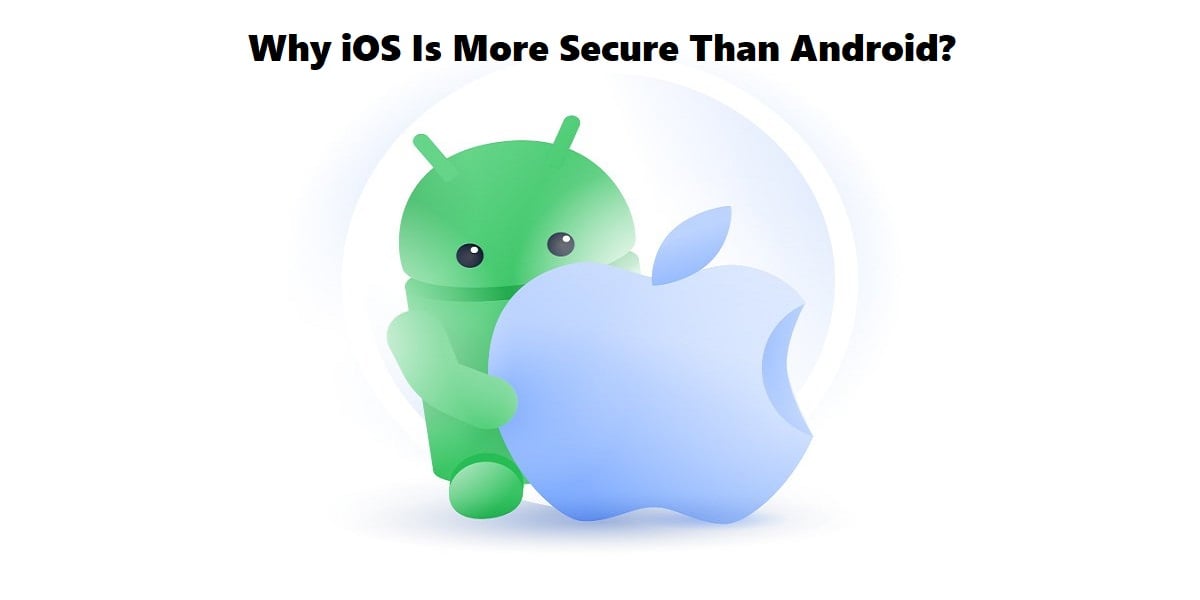Security isn't the first issue that comes to mind when most people start searching for a smartphone. The operating system you install on your smartphone has a big influence on its security. The way operating systems are developed and maintained has a significant influence on how secure your phone is, and the security provided by the best smartphone alternatives differs significantly.
Many individuals are unprepared for the risks of using their phones as a single point of access to all of their important information. While users have much of the responsibility for safe conduct, device and software manufacturers also play a part in building secure platforms. In this composition, we will concentrate on why iOS devices are safer to use than Android handsets.
Why iOS Is More Secure Than Android?
1. Market Share
The market share of an OS is sometimes used to assess its security. Since hackers, virus authors, and fraudsters desire to be as effective as possible, the most convenient way to do so is to attack a widely used platform. Android is the most prevalent operating system, with a market share of 85 percent. Apple's iOS is acquiring a 15% market share, making it the second most popular mobile operating system in the world.
While this is fantastic for Google, the fact that Android has such a large market share makes it a tempting target for hackers. After all, they have more "clients" than iOS. As a result, developing malicious software for the Google system is considerably more lucrative. Thus, having a big market share is advantageous, except in terms of security. In this case, being smaller and so having a smaller target is the preferable alternative.
Related Post: “How To Get Instagram Followers: 5 Tips To Follow”
2. Sandbox Technology
The operating systems of Apple and Google, as well as how they enable apps to work, are vastly different, resulting in vastly different security issues. These considerations should be addressed if you're selecting between an iPhone and an Android. Apple uses a technique known as sandboxing.
This basically implies that each program operates in its own "sandbox," or walled-off environment, where it may do whatever it wants but can not interact with other programs or the OS after a point of time.
Android, on the other hand, was created with the goal of being as open and adaptable as possible. Consumers and developers benefit from this, but it also leaves the platform more open to attacks.
3. Face ID Recognition
Face recognition is a feature found on both iOS and Android devices that uses your face as a password to unlock the device. This scanner scans your face in three dimensions and finds 30,000 unique characteristics. This way, your iPhone will unlock even if you're wearing a hat or cap. Face ID is a more secure version of this technology that is available on the iPhone X, XS, and XR.
Security experts have shown that a photograph of a face, rather than a real one, may deceive Android's system. Samsung has even issued a warning about the feature, stating that it isn't as secure as fingerprint scanning. Apple, on the other hand, has created a system that is unaffected by pictures and can recognize your face even if you wear glasses or have a beard.
4. Jailbreaking
The App Store is the place to go if you want to download apps. Because Apple controls all of the programs in this store, it is responsible for their safety. This means that, unlike Google, you won't be able to download applications from anywhere else. One aspect that might severely reduce an iPhone's security is the fact that it has been jailbroken.
Jailbreaking is a technique for getting around some of Apple's restrictions on iPhones, allowing users to install almost any app they want. Android phones may easily download apk files outside of the official Play Store. This improves your supply as a user, but it also raises your risk. Google cannot guarantee the security of apps outside of its own store since it has no control over them. Apple is unconcerned about this.
5. Source System
Android is an open-source operating system that is free to use. This means that the source code is available to anyone who wants to look at it. In contrast, iOS is a closed system that only Apple comprehends. Anyone can use Android to look for potential flaws and gain a better understanding of how the system operates.
Apple's system was recently closed, enabling individuals to maintain total control and set their own rules. As a result, app developers must adhere to a set of rules. Their apps will not be approved into the App Store if they do not do so.
Final Thoughts
Finally, deciding which platform to use requires finding a balance between flexibility and the danger of being a hacker target. Whether it's an iOS or an Android smartphone, the features available vary significantly. In terms of security, however, iOS tends to outperform Android.

